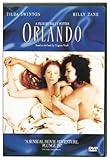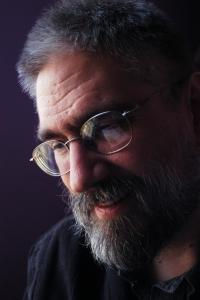Orlando
Starring Tilda Swinton, Billy Zane and Quentin Crisp
Directed by Sally Potter
Review by Carl McColman
 This is one of those films that rewards repeated viewings. I recently saw it for the third time (having seen it in the theater in 1993, and later on when it first came out on DVD), and with each subsequent viewing I laugh harder, find more to think about, and am generally more entranced by the wondrously magical world that director Sally Potter has conjured out of Virginia Woolf's gender-bending pirouette through four centuries of English history, culture, and literature.
This is one of those films that rewards repeated viewings. I recently saw it for the third time (having seen it in the theater in 1993, and later on when it first came out on DVD), and with each subsequent viewing I laugh harder, find more to think about, and am generally more entranced by the wondrously magical world that director Sally Potter has conjured out of Virginia Woolf's gender-bending pirouette through four centuries of English history, culture, and literature.Tilda Swinton (who in 2005 wowed the mainstream with her performance as the White Witch Jadis in the big-screen adaptation of The Lion, the Witch and the Wardrobe) is Orlando, whom we first meet as a delicate young lad at the end of the sixteenth century, a favorite of Queen Elizabeth (brilliantly played by Quentin Crisp). The playful erotic tension between the queen (an old woman, portrayed by a man) and the hero (a young man, portrayed by a woman) alone makes this a fun and worthwhile movie to explore. But the sexual deconstruction of the movie's opening act really is just an hors-d'oeuvre to whet the appetite for the increasingly layered, enigmatic, yet ultimately pointedly feminist story that will unravel, with 400 years of British vanity and irony crammed into 93 cinematic minutes.
As a favorite of the Virgin Queen, Orlando is given the gift of the beautiful country house in which he lives with his family. But there's a catch: Elizabeth exhorts the boy to never grow old and never fade. This he does, like some British cousin to the Tuck Everlasting clan, agelessly wandering through the ages, exploring such themes as death, love, poetry, politics, society and sex. In many ways Orlando is simply a metaphor for British literature, and so as the eighteenth century yields to the nineteenth (and the so-called Enlightenment insists that science is the only "manly" pursuit, relegating poetry to the "affectations" of women). Orlando wakes one morning and, in a luminously filmed scene of transcendent wonder, discovers the he is now a she. But not to worry: this climactic moment is given a twist by Swinton's brilliantly deadpan delivery of her ironic first thoughts as a woman: "Same person. No difference at all... just a different sex."
But if Orlando was troubled by gender politics as a man, she soon finds out just how much worse things get now that she has no penis to shield her from the brunt of her culture's mindless sexism. Not only is she trivialised and dismissed, but the powers that be set their sights on her house, which, after all, cannot be owned by a mere female. Undaunted, Orlando proceeds to revel in the sensual pleasures of being a woman (joined by Billy Zane as her eye-worthy lover), and as she wanders through the World War I era battlefields into the twentieth century, she discovers just where her power really lies in relation to the past.
Filled with memorable images and playing out like an extended dream sequence, Orlando may not appeal to those who want the films to combine non-stop action with a simple and easy-to-follow storyline. But fans of Virginia Woolf's darkly visionary prose ought to find plenty to cheer about in this film, as will anyone interested in the subtle relationships between society and the arts (and how gender politics intersect with both of those vectors). Just remember: be prepared to watch it more than once.


0 Comments:
Post a Comment
<< Home